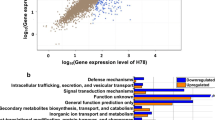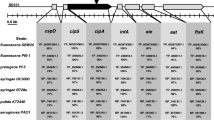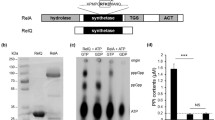Abstract
Pseudomonas protegens H78 produces multiple secondary metabolites, including antibiotics and iron carriers. The guanosine pentaphosphate or tetraphosphate ((p)ppGpp)-mediated stringent response is utilized by bacteria to survive during nutritional starvation and other stresses. RelA/SpoT homologues are responsible for the biosynthesis and degradation of the alarmone (p)ppGpp. Here, we investigated the global effect of relA/spoT dual deletion on the transcriptomic profiles, physiology, and metabolism of P. protegens H78 grown to mid- to late log phase. Transcriptomic profiling revealed that relA/spoT deletion globally upregulated the expression of genes involved in DNA replication, transcription, and translation; amino acid metabolism; carbohydrate and energy metabolism; ion transport and metabolism; and secretion systems. Bacterial growth was partially increased, while the cell survival rate was significantly reduced by relA/spoT deletion in H78. The utilization of some nutritional elements (C, P, S, and N) was downregulated due to relA/spoT deletion. In contrast, relA/spoT mutation globally inhibited the expression of secondary metabolic gene clusters (plt, phl, prn, ofa, fit, pch, pvd, and has). Correspondingly, antibiotic and iron carrier biosynthesis, iron utilization, and antibiotic resistance were significantly downregulated by the relA/spoT mutation. This work highlights that the (p)ppGpp-mediated stringent response regulatory system plays an important role in inhibiting primary metabolism and activating secondary metabolism in P. protegens.









Similar content being viewed by others
References
Abby SS, Cury J, Guglielmini J, Neron B, Touchon M, Rocha EP (2016) Identification of protein secretion systems in bacterial genomes. Sci Rep 6:23080. https://doi.org/10.1038/srep23080
Atkinson GC, Tenson T, Hauryliuk V (2011) The RelA/SpoT homolog (RSH) superfamily: distribution and functional evolution of ppGpp synthetases and hydrolases across the tree of life. PLoS One 6(8):e23479. https://doi.org/10.1371/journal.pone.0023479
Bokinsky G, Baidoo EE, Akella S, Burd H, Weaver D, Alonso-Gutierrez J, Garcia-Martin H, Lee TS, Keasling JD (2013) HipA-triggered growth arrest and beta-lactam tolerance in Escherichia coli are mediated by RelA-dependent ppGpp synthesis. J Bacteriol 195(14):3173–3182. https://doi.org/10.1128/JB.02210-12
Bolger AM, Lohse M, Usadel B (2014) Trimmomatic: a flexible trimmer for Illumina sequence data. Bioinformatics 30(15):2114–2120. https://doi.org/10.1093/bioinformatics/btu170
Calloni G, Chen T, Schermann SM, Chang HC, Genevaux P, Agostini F, Tartaglia GG, Hayer-Hartl M, Hartl FU (2012) DnaK functions as a central hub in the E. coli chaperone network. Cell Rep 1(3):251–264. https://doi.org/10.1016/j.celrep.2011.12.007
Camon E, Barrell D, Lee V, Dimmer E, Apweiler R (2004) The Gene Ontology Annotation (GOA) database—an integrated resource of GO annotations to the UniProt Knowledgebase. Silico Biol 4(1):5–6
Chancey ST, Wood DW, Pierson LS 3rd (1999) Two-component transcriptional regulation of N-acyl-homoserine lactone production in Pseudomonas aureofaciens. Appl Environ Microbiol 65(6):2294–2299
Chatnaparat T, Li Z, Korban SS, Zhao Y (2015) The bacterial alarmone (p)ppGpp is required for virulence and controls cell size and survival of Pseudomonas syringae on plants. Environ Microbiol 17(11):4253–4270. https://doi.org/10.1111/1462-2920.12744
Chen Y, Wang X, Huang X, Zhang X, Xu Y (2008) Las-like quorum-sensing system negatively regulates both pyoluteorin and phenazine-1-carboxylic acid production in Pseudomonas sp. M18. Sci China C Life Sci 51(2):174–181. https://doi.org/10.1007/s11427-008-0026-8
Conrad TM, Frazier M, Joyce AR, Cho BK, Knight EM, Lewis NE, Landick R, Palsson BO (2010) RNA polymerase mutants found through adaptive evolution reprogram Escherichia coli for optimal growth in minimal media. Proc Natl Acad Sci U S A 107(47):20500–20505. https://doi.org/10.1073/pnas.0911253107
Dalebroux ZD, Swanson MS (2012) ppGpp: magic beyond RNA polymerase. Nat Rev Microbiol 10(3):203–212. https://doi.org/10.1038/nrmicro2720
Ferullo DJ, Lovett ST (2008) The stringent response and cell cycle arrest in Escherichia coli. PLoS Genet 4(12):e1000300. https://doi.org/10.1371/journal.pgen.1000300
Gross H, Loper JE (2009) Genomics of secondary metabolite production by Pseudomonas spp. Nat Prod Rep 26(11):1408–1446. https://doi.org/10.1039/b817075b
Gross H, Stockwell VO, Henkels MD, Nowak-Thompson B, Loper JE, Gerwick WH (2007) The genomisotopic approach: a systematic method to isolate products of orphan biosynthetic gene clusters. Chem Biol 14(1):53–63. https://doi.org/10.1016/j.chembiol.2006.11.007
Haas D, Keel C (2003) Regulation of antibiotic production in root-colonizing Peudomonas spp. and relevance for biological control of plant disease. Annu Rev Phytopathol 41:117–153. https://doi.org/10.1146/annurev.phyto.41.052002.095656
Hauryliuk V, Atkinson GC, Murakami KS, Tenson T, Gerdes K (2015) Recent functional insights into the role of (p)ppGpp in bacterial physiology. Nat Rev Microbiol 13(5):298–309. https://doi.org/10.1038/nrmicro3448
Hesketh A, Chen WJ, Ryding J, Chang S, Bibb M (2007) The global role of ppGpp synthesis in morphological differentiation and antibiotic production in Streptomyces coelicolor A3(2). Genome Biol 8(8):R161. https://doi.org/10.1186/gb-2007-8-8-r161
Huang X, Zhu D, Ge Y, Hu H, Zhang X, Xu Y (2004) Identification and characterization of pltZ, a gene involved in the repression of pyoluteorin biosynthesis in Pseudomonas sp. M18. FEMS Microbiol Lett 232(2):197–202. https://doi.org/10.1016/S0378-1097(04)00074-6
Huang X, Zhang X, Xu Y (2008) PltR expression modulated by the global regulators GacA, RsmA, LasI and RhlI in Pseudomonas sp. M18. Res Microbiol 159(2):128–136. https://doi.org/10.1016/j.resmic.2007.10.006
Huang X, Wang Z, Liu Y, Zhang X (2017) Complete genome sequence of Pseudomonas protegens H78, a plant growth-promoting rhizobacterium. Genome Announc 5(16):e00233–e00217. https://doi.org/10.1128/genomeA.00233-17
Jimenez PN, Koch G, Thompson JA, Xavier KB, Cool RH, Quax WJ (2012) The multiple signaling systems regulating virulence in Pseudomonas aeruginosa. Microbiol Mol Biol Rev 76(1):46–65. https://doi.org/10.1128/MMBR.05007-11
Jousset A, Schuldes J, Keel C, Maurhofer M, Daniel R, Scheu S, Thuermer A (2014) Full-genome sequence of the plant growth-promoting bacterium Pseudomonas protegens CHA0. Genome Announc 2(2):e00322–e00314. https://doi.org/10.1128/genomeA.00322-14
King EO, Ward MK, Raney DE (1954) Two simple media for the demonstration of pyocyanin and fluorescin. J Lab Clin Med 44(2):301–307
Konieczny I, Zylicz M (1999) Role of bacterial chaperones in DNA replication. Genet Eng (N Y) 21:95–111
Liu Y, Shi H, Wang Z, Huang X, Zhang X (2018) Pleiotropic control of antibiotic biosynthesis, flagellar operon expression, biofilm formation, and carbon source utilization by RpoN in Pseudomonas protegens H78. Appl Microbiol Biotechnol 102(22):9719–9730. https://doi.org/10.1007/s00253-018-9282-0
Loper JE, Henkels MD, Rangel LI, Olcott MH, Walker FL, Bond KL, Kidarsa TA, Hesse CN, Sneh B, Stockwell VO, Taylor BJ (2016) Rhizoxin, orfamide a, and chitinase production contribute to the toxicity of Pseudomonas protegens strain Pf-5 to Drosophila melanogaster. Environ Microbiol 18(10):3509–3521. https://doi.org/10.1111/1462-2920.13369
Love MI, Huber W, Anders S (2014) Moderated estimation of fold change and dispersion for RNA-seq data with DESeq2. Genome Biol 15(12):550. https://doi.org/10.1186/s13059-014-0550-8
Lu J, Huang X, Li K, Li S, Zhang M, Wang Y, Jiang H, Xu Y (2009) LysR family transcriptional regulator PqsR as repressor of pyoluteorin biosynthesis and activator of phenazine-1-carboxylic acid biosynthesis in Pseudomonas sp. M18. J Biotechnol 143(1):1–9. https://doi.org/10.1016/j.jbiotec.2009.06.008
Manuel J, Berry C, Selin C, Fernando WG, de Kievit TR (2011) Repression of the antifungal activity of Pseudomonas sp. strain DF41 by the stringent response. Appl Environ Microbiol 77(16):5635–5642. https://doi.org/10.1128/AEM.02875-10
Manuel J, Selin C, Fernando WG, de Kievit T (2012) Stringent response mutants of Pseudomonas chlororaphis PA23 exhibit enhanced antifungal activity against Sclerotinia sclerotiorum in vitro. Microbiology 158:207–216. https://doi.org/10.1099/mic.0.053082-0
Mortazavi A, Williams BA, McCue K, Schaeffer L, Wold B (2008) Mapping and quantifying mammalian transcriptomes by RNA-Seq. Nat Methods 5(7):621–628. https://doi.org/10.1038/nmeth.1226
Murphy H, Cashel M (2003) Isolation of RNA polymerase suppressors of a (p)ppGpp deficiency. Methods Enzymol 371:596–601. https://doi.org/10.1016/S0076-6879(03)71044-1
Noinaj N, Guillier M, Barnard TJ, Buchanan SK (2010) TonB-dependent transporters: regulation, structure, and function. Annu Rev Microbiol 64:43–60. https://doi.org/10.1146/annurev.micro.112408.134247
Ogata H, Goto S, Fujibuchi W, Kanehisa M (1998) Computation with the KEGG pathway database. Biosystems 47(1–2):119–128. https://doi.org/10.1016/s0303-2647(98)00017-3
Paulsen IT, Press CM, Ravel J, Kobayashi DY, Myers GS, Mavrodi DV, DeBoy RT, Seshadri R, Ren Q, Madupu R, Dodson RJ, Durkin AS, Brinkac LM, Daugherty SC, Sullivan SA, Rosovitz MJ, Gwinn ML, Zhou L, Schneider DJ, Cartinhour SW, Nelson WC, Weidman J, Watkins K, Tran K, Khouri H, Pierson EA, Pierson LS 3rd, Thomashow LS, Loper JE (2005) Complete genome sequence of the plant commensal Pseudomonas fluorescens Pf-5. Nat Biotechnol 23(7):873–878. https://doi.org/10.1038/nbt1110
Pechy-Tarr M, Bruck DJ, Maurhofer M, Fischer E, Vogne C, Henkels MD, Donahue KM, Grunder J, Loper JE, Keel C (2008) Molecular analysis of a novel gene cluster encoding an insect toxin in plant-associated strains of Pseudomonas fluorescens. Environ Microbiol 10(9):2368–2386. https://doi.org/10.1111/j.1462-2920.2008.01662.x
Potrykus K, Cashel M (2008) (p)ppGpp: still magical? Annu Rev Microbiol 62:35–51. https://doi.org/10.1146/annurev.micro.62.081307.162903
Potrykus K, Murphy H, Philippe N, Cashel M (2011) ppGpp is the major source of growth rate control in E. coli. Environ Microbiol 13(3):563–575. https://doi.org/10.1111/j.1462-2920.2010.02357.x
Sambrook J, Russell DW (2001) Molecular cloning: a laboratory manual, 3rd edn. Cold Spring Harbor Laboratory Press, Cold Spring Harbor, NY
Schwyn B, Neilands JB (1987) Universal chemical assay for the detection and determination of siderophores. Anal Biochem 160(1):47–56
Silby MW, Winstanley C, Godfrey SA, Levy SB, Jackson RW (2011) Pseudomonas genomes: diverse and adaptable. FEMS Microbiol Rev 35(4):652–680. https://doi.org/10.1111/j.1574-6976.2011.00269.x
Sinha AK, Winther KS, Roghanian M, Gerdes K (2019) Fatty acid starvation activates RelA by depleting lysine precursor pyruvate. Mol Microbiol 112(4):1339–1349. https://doi.org/10.1111/mmi.14366
Steinchen W, Bange G (2016) The magic dance of the alarmones (p)ppGpp. Mol Microbiol 101(4):531–544. https://doi.org/10.1111/mmi.13412
Takeuchi K, Yamada K, Haas D (2012) ppGpp controlled by the Gac/Rsm regulatory pathway sustains biocontrol activity in Pseudomonas fluorescens CHA0. Mol Plant-Microbe Interact 25(11):1440–1449. https://doi.org/10.1094/MPMI-02-12-0034-R
Takeuchi K, Noda N, Someya N (2014) Complete genome sequence of the biocontrol strain Pseudomonas protegens Cab57 discovered in Japan reveals strain-specific diversity of this species. PLoS One 9(4):e93683. https://doi.org/10.1371/journal.pone.0093683
Tatusov RL, Galperin MY, Natale DA, Koonin EV (2000) The COG database: a tool for genome-scale analysis of protein functions and evolution. Nucleic Acids Res 28(1):33–36. https://doi.org/10.1093/nar/28.1.33
Trapnell C, Roberts A, Goff L, Pertea G, Kim D, Kelley DR, Pimentel H, Salzberg SL, Rinn JL, Pachter L (2012) Differential gene and transcript expression analysis of RNA-seq experiments with TopHat and cufflinks. Nat Protoc 7(3):562–578. https://doi.org/10.1038/nprot.2012.016
Wang Z, Huang X, Liu Y, Yang G, Zhang X (2017) GacS/GacA activates pyoluteorin biosynthesis through Gac/Rsm-RsmE cascade and RsmA/RsmE-driven feedback loop in Pseudomonas protegens H78. Mol Microbiol 105(6):968–985. https://doi.org/10.1111/mmi.13749
Wei X, Huang X, Tang L, Wu D, Xu Y (2013) Global control of GacA in secondary metabolism, primary metabolism, secretion systems, and motility in the rhizobacterium Pseudomonas aeruginosa M18. J Bacteriol 195(15):3387–3400. https://doi.org/10.1128/JB.00214-13
Wingett SW, Andrews S (2018) FastQ screen: a tool for multi-genome mapping and quality control. F1000Res 7:1338. https://doi.org/10.12688/f1000research.15931.2
Winstanley C, Langille MG, Fothergill JL, Kukavica-Ibrulj I, Paradis-Bleau C, Sanschagrin F, Thomson NR, Winsor GL, Quail MA, Lennard N, Bignell A, Clarke L, Seeger K, Saunders D, Harris D, Parkhill J, Hancock RE, Brinkman FS, Levesque RC (2009) Newly introduced genomic prophage islands are critical determinants of in vivo competitiveness in the Liverpool epidemic strain of Pseudomonas aeruginosa. Genome Res 19(1):12–23. https://doi.org/10.1101/gr.086082.108
Wu DQ, Ye J, Ou HY, Wei X, Huang X, He YW, Xu Y (2011) Genomic analysis and temperature-dependent transcriptome profiles of the rhizosphere originating strain Pseudomonas aeruginosa M18. BMC Genomics 12:438. https://doi.org/10.1186/1471-2164-12-438
Yan A, Huang X, Liu H, Dong D, Zhang D, Zhang X, Xu Y (2007) An rhl-like quorum-sensing system negatively regulates pyoluteorin production in Pseudomonas sp. M18. Microbiology 153(1):16–28. https://doi.org/10.1099/mic.0.29211-0
Zhang W, Zhao Z, Zhang B, Wu XG, Ren ZG, Zhang LQ (2014) Posttranscriptional regulation of 2,4-diacetylphloroglucinol production by GidA and TrmE in Pseudomonas fluorescens 2P24. Appl Environ Microbiol 80(13):3972–3981. https://doi.org/10.1128/AEM.00455-14
Zhao Q, Poole K (2000) A second tonB gene in Pseudomonas aeruginosa is linked to the exbB and exbD genes. FEMS Microbiol Lett 184(1):127–132
Zolotarev AS, Unnikrishnan M, Shmukler BE, Clark JS, Vandorpe DH, Grigorieff N, Rubin EJ, Alper SL (2008) Increased sulfate uptake by E. coli overexpressing the SLC26-related SulP protein Rv1739c from Mycobacterium tuberculosis. Comp Biochem Physiol A Mol Integr Physiol 149(3):255–266. https://doi.org/10.1016/j.cbpa.2007.12.005
Funding
This study was sponsored by Natural Science Foundation of Shanghai (19ZR1427600) and National Natural Science Foundation of China (31470196, 31270083). This work was also supported by the National Key Research and Development Program of China (2019YFA0904302).
Author information
Authors and Affiliations
Corresponding author
Ethics declarations
Conflict of interest
The authors declare that they have no conflict of interest.
Ethical approval
This article does not contain any studies with human participants by any of the authors.
Additional information
Publisher’s note
Springer Nature remains neutral with regard to jurisdictional claims in published maps and institutional affiliations.
Electronic supplementary material
ESM 1
(PDF 4048 kb)
Rights and permissions
About this article
Cite this article
Wu, L., Wang, Z., Guan, Y. et al. The (p)ppGpp-mediated stringent response regulatory system globally inhibits primary metabolism and activates secondary metabolism in Pseudomonas protegens H78. Appl Microbiol Biotechnol 104, 3061–3079 (2020). https://doi.org/10.1007/s00253-020-10421-5
Received:
Revised:
Accepted:
Published:
Issue Date:
DOI: https://doi.org/10.1007/s00253-020-10421-5




